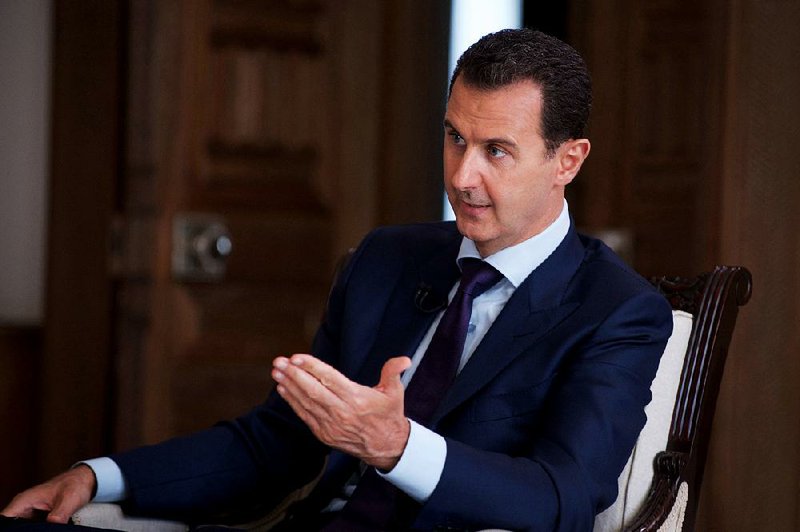SYDNEY -- Western nations publicly critical of Syrian President Bashar Assad's regime have been quietly sending security officials to collaborate with his government, Assad said in an interview broadcast Friday.
In a Damascus interview with Australia's SBS news channel, the Syrian leader accused Western governments of hypocrisy for criticizing him while working with him behind the scenes.
"This is the double standard of the West in general: They attack us politically and they send us their officials to deal with us under the table, especially the security, including your government," Assad told SBS.
"They all do the same. They don't want to upset the United States. Actually, most of the Western officials, they only repeat what the United States wants them to say. This is the reality," he said.
President Barack Obama is opposed to armed intervention in Syria's civil war, which has left at least 250,000 people dead and contributed to a global migrant crisis. Though he blamed Assad for using chemical weapons in 2013 and threatened military strikes against Syrian forces, he has thus far only authorized strikes against the Islamic State movement and other U.S.-designated terror groups in Syria.
Assad said that while he had no dialogue directly with the U.S., there was indirect communication between the countries through back channels, including "businessmen going [and] traveling around the world and meeting with the officials in the United States and in Europe."
"But there's nothing serious," he said. "Because we don't think the administration -- the American administration -- is serious about solving the problem in Syria."
In September, Russia started an air campaign in Syria in support of Assad, tipping the balance on the ground in favor of his forces.
"When the Russian air support started, only at that time ... ISIS stopped expanding," Assad said, using an acronym for the Islamic State extremist militia.
Assad said he was not opposed to working with the U.S. but criticized the U.S. for creating problems that it fails to solve.
"[Former President George W.] Bush invaded Iraq; in a few weeks, he could occupy Iraq. But then what's next? It's not about occupying. This is a great power. We're not a great power," Assad said.
"So, it's not about America occupying Syria. What's next? What do they want to achieve? They haven't achieved anything. They have failed in Libya, in Iraq, in Yemen, in Syria -- everywhere. They only created chaos. So if the United States wants to create more chaos, it can ... but can they solve the problem? No."
Assad said he wasn't concerned about a recent internal memo from more than 50 U.S. State Department officials urging U.S. military action against Syria's government. The diplomats who signed the "dissent channel cable" saidtargeted U.S. attacks could increase leverage over Assad in diplomatic negotiations that have repeatedly failed.
"Warmongers in every American administration always exist," Assad said. "It's not something new."
Assad also criticized British officials over the result of last week'sreferendum to leave the European Union.
"Those officials who used to give me the advice about how to deal with the crisis in Syria ... [have] proven ... to be disconnected from reality," he said.
Meanwhile, a Syrian pilot whose warplane crashed east of the capital of Damascus on Friday has been killed, the Syrian Observatory for Human Rights said, blaming Syria's al-Qaida branch known as the Nusra Front for his death.
The state-run Syrian Arab News Agency said earlier that a warplane crashed because of "technical failure during a training mission" and that the pilot, who ejected successfully from the plane, was missing. The eastern suburbs of Damascus, where the crash took place, are held by rebels opposed to Assad.
The Jaish al-Islam, or Army of Islam, a rebel group operating east of Damascus, said it shot down the plane and published an interview with the pilot, who said he has been a Syrian army pilot for the past 16 years. The claim that the plane had been shot down could not be confirmed. Rebels in Syria have long called on their backers to arm them with anti-aircraft missiles against Syrian airstrikes.
The group later published on its social media channels a picture of him dead, apparently shot in the head, and said a member of the Nusra Front had killed him despite the extremist group's pledge to hand him over to Jaish al-Islam. That claim could not be independently confirmed either.
Jaish al-Islam, like the al-Qaida affiliate, is considered a terrorist group by the Syrian government and Russia.
At least 4,900 people -- among them 1,200 civilians -- were killed in Syria's violence in June, the Observatory reported Friday.
Information for this article was contributed by staff members of The Associated Press and by Weedah Hamzah of Tribune News Service.
A Section on 07/02/2016


